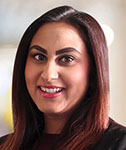
I started my career in law straight out of completing my LLM in Medical Ethics at University of Manchester. I’d chosen this subject as I’ve always been passionate to challenge the current deficiencies and misconceptions in our society regarding the contentious lines drawn regarding mental capacity for the mentally ill and the terminally sick.
My law career began 10 years ago when I joined the Costs department at Horwich Farrelly in Manchester, where I worked my way from Paralegal to a Costs Team Leader, developing my skills as both a lawyer and as a manager, managing a team of people from a broad spectrum of ages, backgrounds, beliefs, and abilities, which allowed me to learn from a very early stage in my career how to treat people with the respect they deserve, by championing our different backgrounds.
I later moved to Slater & Gordon to further develop my costs experience and was entrusted to deal with specialist costs matters including mesothelioma and asbestos cases and technical high value and catastrophic Loss cases, which heavily influenced the next step in my career. I wanted to do more to reach these clients and to that end I moved across to the industrial disease department, specialising in asbestos claims. I immediately fell in love with the work as it enabled me to provide a voice to those who often do not have one, and to assist clients and their families on the road to rebuilding their lives.
At this point, I knew industrial disease work was for me, and I wanted to continue developing my expertise in that area. I decided to qualify through the Cilex route, undertaking my training, whilst remaining in the industrial disease department. I worked full time whilst studying part-time in order to gain my qualifications. Attending law school at the weekend while working full-time was hard work, but looking back now I would not have had it any other way. Following this, I cross-qualified as a Solicitor and later was promoted to Associate. The hardest part of this job is assisting terminally ill clients and families with their claims, knowing that my efforts will not be able to save them from their disease. The devastation to their families is challenging to see but being able to obtain a sense of justice for these clients makes it even more worthwhile.
Over the last 10 years I have seen the legal industry transform from one distinctly lacking in diversity to a place where people of all walks of life flourished. There is still much to be done to improve things further, but the alternate routes to qualification, one which I took myself, has certainly worked wonders in opening up access to the legal profession. As a woman of colour, I have spent my life living with the challenges of discrimination and so it is extremely important to me to champion diversity and equality in the workplace. I am the Co-chair of the Multicultural and Diversity Network and I work hard to promote and develop initiatives to support individuals in order to bring a wider range of talent into the legal profession, from the backgrounds of both the underprivileged and the underrepresented. We represent an extremely broad client base, and it is vital to me that the profession reflects the clients we support to better understand the struggles they have experienced.